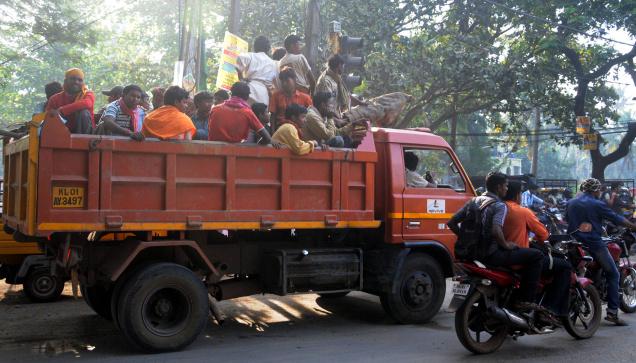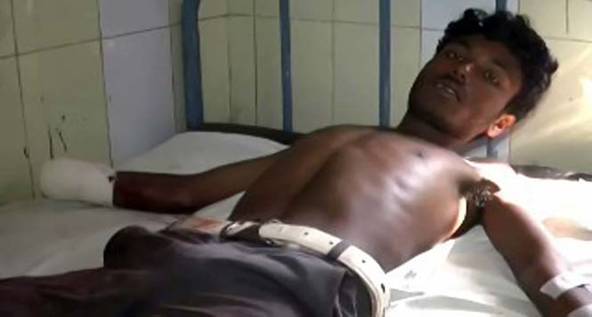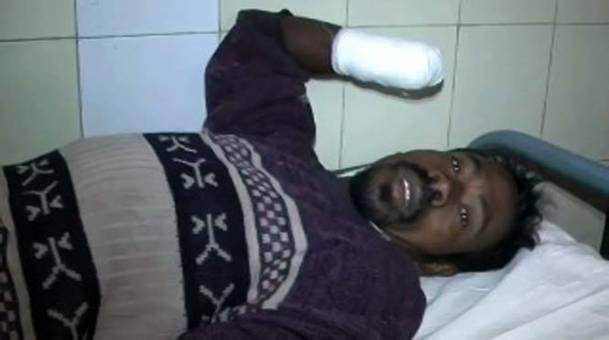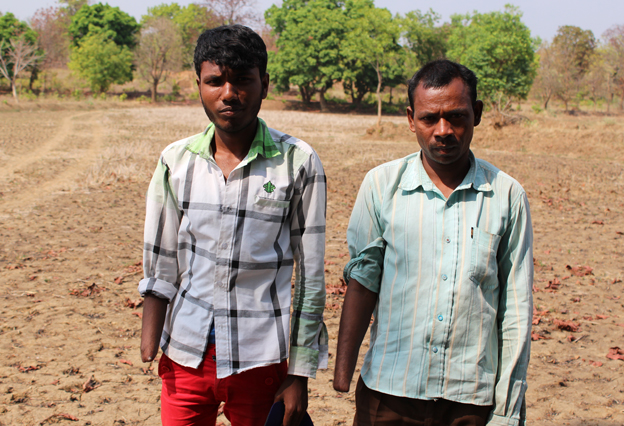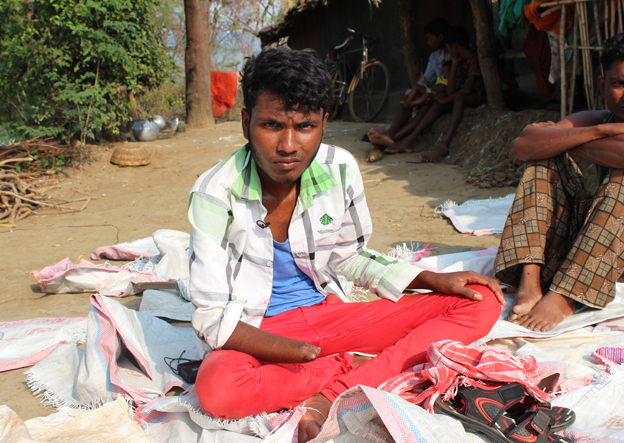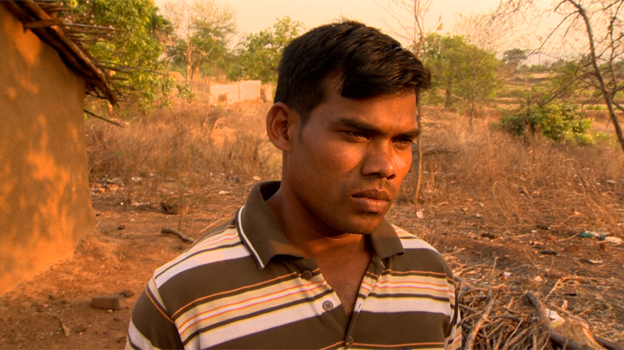The Story Of An Indian Labourer Who Had His Hand Chopped Off For Trying To Escape
Millions of workers in India are thought to be held in conditions little better than slavery - one man whose hand was cut off when he tried to escape tells his story.
Editor's note: Due to its gory details and graphic photos, some readers may find the story disturbing
It was in early December 2013 that a friend from a nearby village told Nial about a job in brick kiln for which he would supposedly get RM530 up front. It was all being organised by the friend's neighbour, Bimal, who was trying out working as a broker.
Nial, the friend, whose name is Nilamber, along with Bimal, and 10 others travelled by bus to meet the main contractor. "I knew he was a rich man. He had a motorcycle and wore a tie," says Nial.
The contractor showed them the money, but took it straight back. They would not in fact get it up front, he said, but some time later. Nial nonetheless believed he would still be paid and agreed to work - although illegal, it meant he had technically taken the bond.
rediff.comThe men, all 13 of them, were taken the next day to the railway station at Raipur, the capital of Chhattisgargh state
An unrelated photo of migrant labourers being transported in a truck to a work site in Kerala.
Image via thehindu.comThen, instead of being sent on a short journey to a brick kiln as they had been promised, they discovered the train was heading 500 miles (800km) south to Hyderabad, a thriving city and a pillar of India's economic success. But some in the group had already heard stories about forced labour there, and got ready to rebel.
When the train stopped at a station, all except Nial and Nilamber escaped. Instead of continuing to Hyderabad the contractor took them back to Raipur, spending some of the journey on his mobile phone, arranging their reception.
"His henchmen were waiting for us," recalls Nial. "They held us and put their hands over our mouths to stop us shouting."
At this point, Bimal slipped away. Nial and Nilamber were taken back to the contractor's house and held hostage. "They called our families telling them to pay money for our release," says Nial. "They beat us hard so my brother could hear me crying in pain down the phone."
The contractor demanded that Nial pay him 20,000 rupees (RM1062) for his release but his family was unable to raise the money. He and Nilamber were held for five days. During the day they were made to work on the contractor's farm. In the evenings they were beaten.
countercurrents.orgOn the sixth day, his kidnappers were drinking heavily. The contractor and five of his men drove them to remote woodland. That's when Dialu Nial's life changed forever.
Dialu Nial, the migrant labourer - whose hands were chopped by a labour contractor - lying on his bed in Bhawanipatna district headquarters hospital.
Image via countercurrents.orgHe was held down by his neck in a forest and one of his kidnappers raised an axe to strike. He was asked if he wanted to lose his life, a leg or a hand.
First they were held down and beaten. Then, they were made to kneel - and mutilated. "They threw my hand into the woods," he says. "I wrapped my left hand around my wound and held it tight. I squeezed it to stop the bleeding until the pain became too much and I released it. Then I had to grip it again."
indiatimes.comNilambar Dhangda Majhi, the migrant labourer - whose hands were chopped by a labour contractor - lying on his bed in Bhawanipatna district headquarters hospital.
Image via countercurrents.orgBoth Nial and his friend chose to lose their right hands. Nial had to watch while his friend's hand was cut first.
"They put his arm on a rock. One held his neck and two held his arm. Another brought down the axe and severed his hand just like a chicken's head. Then they cut mine."
"The pain was terrible. I thought I was going to die," says Nial
"They threw my hand into the woods," he says. "I wrapped my left hand around my wound and held it tight. I squeezed it to stop the bleeding until the pain became too much and I released it. Then I had to grip it again."
A basic survival instinct took over. They followed a stream to a village, where they were able to bind their wounds and cover them with a plastic bag. Then they took a bus to a nearby town to seek hospital treatment. Nial stiffens as he tells the story. Often he stops to gather his thoughts.
nigerianbulletin.comHe has now begun a two-year programme run by a charity, the International Justice Mission, to help him recover from his ordeal
Now free, and his injury healing, he is back home deep in the countryside of Orissa. There is no electricity or sanitation. Many of the villagers are illiterate. "I didn't go to school. When I was a child I tended cattle and harvested rice," Nial says, sitting on the earth outside the cluster of huts which are his family's home.
It is from communities like this that people are liable to be drawn into a system known as bonded labour. Typically a broker finds someone a job and charges a fee that they will repay by working - but their wages are so low that it takes years, or even a whole lifetime. Meanwhile, violence keeps them in line.
Laid out beside Nial are a number of old plastic sacks. His family ekes out a living by unravelling them and turning the individual threads into binding cord.
Awkwardly, Nial wedges a wooden spool of thread between his toes, and holds another in his remaining hand. His brother, Rahaso, sits next to him doing the same.
Nial struggles to wind the cord, his brow creasing. His brother works quickly, outpacing him. Then the spool flips out of Nial's hand. Rahaso gives it back him. Disappointment and anger flood through Nial's face.
countercurrents.orgAs part of his rehabilitation, he joins a group of more than 150 people at a counselling session in Orissa. They have been freed from bonded labour in the past few months, mostly in brick kilns.
Among them are dozens of children. Most of the men have been badly beaten. There are women who have been raped, and two who were kicked in the stomach while pregnant - the husband of one was thrown to his death from a train.
Unusually, arrests have been made in connection with Nial's kidnapping and the suspects are in custody. Bimal, the villager who first recruited them, was arrested and has been released on bail.
Married with two children, and six years older than Nial, he carries himself with far more confidence. It's true he recruited Nial, he says, but he denies any involvement in kidnappings and beatings.
"It wasn't only my mistake - we all made the decision to go. I want to apologise and meet Dialu [Nial] again so we can live together as neighbours," says Bimal.
countercurrents.orgNial, though, rejects any idea of reconciliation. "Jail isn't good enough for them. They should be hanged," he says.
His hopes for the future? "I really want to get married and have a family of my own." But with that, his face darkens again. He glances down and covers his stump with his shirt sleeve. In his culture, with his severed hand, finding a wife and starting a family will be very difficult indeed. He shakes his head sadly. "Of course, I can never forgive them."
